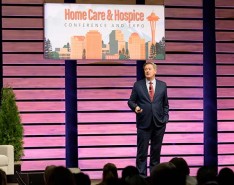legislation
WASHINGTON, D.C. (July 2, 2020)— The Senate cleared legislation to extend the deadline for businesses to apply for coronavirus aid under the Paycheck Protection Program (PPP), hours before the aid package was set to expire.
The bill passed with unanimous consent, and extends the deadline for applying for PPP loans to Aug. 8, 2020.
WASHINGTON, D.C. (June 19, 2020)—The National Association for Home Care & Hospice (NAHC) has joined a prestigious group of like-minded organizations urging the United States Senate to include Medicaid Home and Community Based Services in the next COVID-19 relief package.
WASHINGTON, D.C. (May 21, 2020)—The National Association for Home Care & Hospice announced full support of the COVID-19 Emergency Manufacturing Act, a bicameral bill introduced by Elizabeth Warren (D-MA) in the Senate and Rep.
BIRMINGHAM, Ala. (March 19, 2019)—President Donald Trump signed HR 6201, the Families First Coronavirus Response Act into law yesterday. The bill responds to the novel coronavirus (COVID-19) by providing paid sick leave and free coronavirus testing expanding food assistance and unemployment benefits, and requiring employers to provide additional protections for health care workers.
ALEXANDRIA, Va. (March 13, 2020)—A bipartisan coalition in Congress has introduced the Preserving Patient Access to Home Infusion Act, legislation designed to ensure Medicare patients have access to Part B home infusion medications.
BIRMINGHAM, Ala. (March 11, 2020)—A new piece of legislation could put a financial burden on home health agencies. The bill, introduced by Rep. Rosa DeLauro (CT-03), chair of the House Appropriations Subcommittee, and Sen.
WASHINGTON, D.C. (December 18, 2019)—Provisions permanently excluding manual complex rehab technology (CRT) wheelchairs from the competitive bidding program have been included in FY 2020 appropriations legislation. The legislation also exempts CRT manual accessories from bidding-derived pricing for an 18-month period, starting Jan. 1, 2020.
WASHINGTON, D.C. (October 30, 2019)—On Oct. 28, the House of Representatives approved HR 647, the Palliative Care and Hospice Education and Training Act (PCHETA), legislation that would make improvements in the training, education and provision of palliative and hospice care. The National Association for Home Care & Hospice (NAHC) has advocated for passage of this bill since it was introduced.
CHICAGO (October 11, 2019)—As we kick off Breast Cancer Awareness month, Senator Tammy Duckworth (D-IL), lead sponsor for S.562, the Breast Cancer Patient Equity Act, visited Second Act Mastectomy Boutique in Chicago to meet with breast cancer survivors.
WASHINGTON, D.C. (September 23, 2019)—The House of Representatives Veterans Affairs committee held a hearing on September 11 on H.R. 1527, the Long-Term Care Veterans Choice Act, a bill to expand access to homecare for veterans and help keep them out of institutional settings.
WASHINGTON, D.C. (September 20, 2019)—With the CB Round 2021 bid window closing Wednesday, The American Association for Homecare (AAHomecare) hopes to rally suppliers and other HME stakeholders to resume advocacy on HME policy priorities, including extending and expanding relief for non-bid rural suppliers (HR 2771), CRT-related legislation (HR 2293, S 1223, and HR 2408), and expected legislation on non-invasive ventilators in competitive bidding.
WASHINGTON, D.C. (July 11, 2019)—Efforts to protect access to manual complex rehab technology (CRT) wheelchairs and accessories took another step forward today as the Health Subcommittee of the House Energy & Commerce Committee approved HR 2328, the "Reauthorizing and Extending America's Community Health Act'' (REACH Act). The bill includes similar language to HR 2293, legislation that AAHomecare and other mobility stakeholders have been supporting since its introduction in April.








